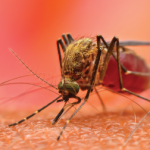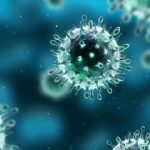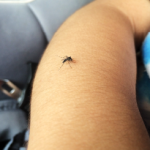NEW YORK (Reuters Health)—A new chikungunya virus-like-particle vaccine appears to be safe and immunogenic, according to results from a phase 2 trial.
“The phase 2 safety, tolerability and immunogenicity were similar to the data seen in an earlier phase 1 study,” Grace L. Chen, MD, of the National Institutes of Health Vaccine Research Center, Bethesda, Md., tells Reuters Health by email. “However, we found the durability of immunogenicity interesting, as it suggests the vaccine regimen used in the trial may be able to induce an immune response for a longer term than previously known.”
Chikungunya virus (CHIKV) is a mosquito-borne virus that causes a febrile illness with arthralgia, polyarthritis and rashes. There are no licensed vaccines or therapies currently.
Dr. Chen and colleagues developed the virus-like-particle vaccine VRC-CHIKVLP059-00-VP (CHIKV VLP) and assessed its safety, tolerability and immunogenicity at six endemic chikungunya virus sites in the Caribbean.
At least one local symptom (pain or tenderness, swelling or redness) was reported by 32% (64/201) of the vaccine group and by 19% (37/199) of the placebo group, with symptoms most often rated as mild and occasionally as moderate in severity.
There were no significant differences in systemic reactogenicity between the vaccine and placebo recipients, the researchers report in JAMA.1
The vaccine was highly immunogenic in the CHIKV focus reduction neutralization test, eliciting positive responses in all but one of the 192 participants who had received both of the planned vaccinations (on days 0 and 28).
The geometric mean titer (GMT) increased from 46.9 at baseline to 2004.5 at Week 8 in the vaccine group but remained virtually unchanged in the placebo group.
The immune response persisted throughout the 72-week study, with 88% of the participants in the vaccine group who were seronegative at baseline maintaining at least a four-fold increase from baseline neutralization titers and 99% were seropositive according to the CHIKV luciferase neutralization assay.
Although the trial was designed to exclude participants who were CHIKV seropositive before enrollment, 78 of 168 trial participants at two sites were retrospectively found to be seropositive on the day of study enrollment. The vaccine proved immunogenic in these participants as well, inducing a two-fold increase in neutralizing antibody after the second vaccination.
“The main message from the study is that this vaccine was safe, well tolerated, and led to a robust immune response in these areas where CHIKV had circulated,” Dr. Chen says.
“FDA approval pathways for vaccines could provide a path to licensure through either traditional efficacy or accelerated approval pathways,” she adds. “Traditional efficacy trials are difficult to conduct for emerging infections that are tough to predict, and when a robust immune response is demonstrated, the accelerated approval pathway could be an option for bringing the vaccine to market more efficiently.”
“As the planet warms, more mosquitos will migrate across North America, including two competent vectors for CHIKV—Aalbopictus and Aedes aegypti,” write Kenneth A. Stapleford, PhD, and Mark J. Mulligan, MD, of the NYU Grossman School of Medicine in a linked editorial. “For CHIKV, it is only a matter of time before further spread of this agent of disabling viral arthritis occurs in the Americas.”2
“Even though current attention, energies, and resources are appropriately targeted on severe acute respiratory syndrome coronavirus 2 (SARS-CoV-2) and COVID-19 at this moment, it is important to keep pushing forward with countermeasures for other global viral threats,” they conclude.
Scott C. Weaver, PhD, of the University of Texas Medical Branch, coauthor of a recent review of Zika, chikungunya and other emerging vector-borne viral diseases, tells Reuters Health by email, “This will likely be an excellent vaccine for travelers going to endemic areas if they plan at least two months in advance, and I think that there is a good chance that this vaccine and two others will be licensed during the next 1–2 years.”
“For the emergency control of explosive outbreaks like those we have seen since 2005, a single-dose vaccine is also needed,” he says. “I assume that immunogenicity of this vaccine after a single dose [not presented in the paper] did not suggest protection, but I wonder if there might be some short-term efficacy after the initial dose.”
Dr. Arturo Reyes-Sandoval of the University of Oxford, U.K., who published a review of chikungunya-vaccine development last year, but was not involved in the new work, tells Reuters Health by email, “I find very interesting the vaccine development against CHIKV, as this is a major problem in tropical and subtropical regions, still being neglected and with a great need for a vaccine due to the long-term joint inflammation in the affected people. The fact that it was tested in regions affected by this infection, and not only in ‘disease-free’ countries, is also very interesting.”
Dr. Meenu Singh of the Postgraduate Institute of Medical Education and Research, Chandigarh, India, who studies chikungunya virus, tells Reuters Health by email, “It is quite heartening that no serious side effects have been observed with this vaccine.”
“Even though this phase 2 trial, which has been done like a randomized controlled trial, has shown immunogenicity of this vaccine, we would need higher powered studies to mandate its use,” says Dr. Singh, who also was not involved in the study.
The research did not have commercial funding, but patents for the vaccine have been licensed by the National Institutes of Health to Emergent BioSolutions. Two of Dr. Chen’s coauthors were employees of Emergent BioSolutions.
References
- Chen GL, Coates EE, Plummer SH, et al. Effect of a chikungunya virus-like particle vaccine on safety and tolerability outcomes: A randomized clinical trial. JAMA. 2020 Apr 14;323(14):1369–1377.
- Stapleford KA, Mulligan MJ. A new vaccine for Chikungunya virus. JAMA. 2020 Apr 14;323(14):1351–1352.


